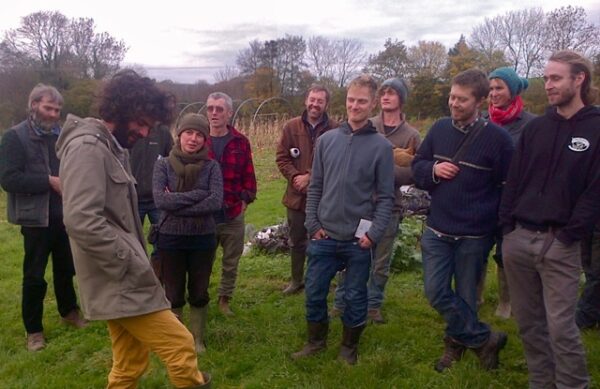Written by Kevin Hobbs
Land Workers Alliance 2013: 23-24 November, Trill Farm, Devon.
Last weekend I found myself drawn out of London again to the south west to spend the weekend at Trill Farm and attend the 2013 AGM of the newly formed Land Workers Alliance of which Sutton Community Farm is a member. The Land Workers Alliance is the first official UK member organisation of the global movement La Via Campesina, which represents 200 million peasant farmers, landless workers and fisherfolk across five continents. The group exists to campaign in support of small producers rights and create a better food system from the bottom up. The group has credibility because all the members have to be actively engaged in land based livelihoods. The competence and confidence of the members is bolstered by the creation of a social network through which farmers can share skills and experience by getting together and visiting each others farms.
The meeting at Trill Farm began with three of the oldest social activities in the book. We ate supper together, had a ceilidh in the medieval barn and sung songs round the campfire til the wee hours. It was a pretty good ice breaker and provided another function of the Land Workers Alliance, enjoyment. We are all prepared to work hard on the land because it provides us with long lasting satisfaction but no person is an island and from what I saw that night I’m pleased to report we’ve got some good parties to look forward to!

The serious business took place on sunday and began with group introductions and an update on some of the work the Land Workers Alliance has done to date.
We heard from John Burbage of the Agricultural Workers Union, on ways in which the two organisations work together, and from Kate McEvoy from the Real Seed Catalogue regarding the negative effect the draft EU Plant Reproductive Material Law will have on the vegetable varieties available to us growers if it is adopted in its current form. Before lunch we split into six working groups and planned how we intend to work on the priority areas of Policy Reform, Smallholder Livelihoods, Seeds, Livestock, Skill Sharing and Access to Land.
I joined the group on seeds as what I heard in Kate McEvoy’s presentation, at risk of sounding over dramatic (again), chilled me to the very bone! Last week I wrote about what I’d learnt at the Soil Symposium and one of the things that came out of it was, the need to develop new varieties that grow well in organic conditions and here is the EU at the same time moving to make this harder for anyone who doesn’t have a large amount of financial backing. To date as Professor Carlo Leifert said in his lecture there has been no breeding research done to develop varieties for the organic sector. There is no provision in the law for growers to save their own seeds and thus develop crops that are well suited to their particular conditions or mixed populations that can respond well under a variety of current climatic conditions such as have been shown to perform well at Wakelyns agroforestry.
For the benefit of anyone who is not already aware the current situation is that unless a seed is on the EU list it is not legal to sell it in the EU but this has not been to rigorously enforced in the UK and there has been a rise in interest in heritage varieties thanks in part to the work of the Heritage Seed Library. To quote directly from the Real seed website, “The European Commision is currently drawing up a new law to regulate the sale of all seeds, plants and plant material. The latest draft of the law is even more restrictive than the regulations that we have at the moment. Every single variety of vegetable will have to be registered on an EU list, otherwise it will be illegal to sell it. To be registered on the list, seed varieties have to pass a series of tests demonstrating what is called DUS ‘Distinctiveness, Uniformity and Stability’. It costs nearly £3000 to test & register just one single variety of seed for sale.”
The EU may bow to pressure and make provision for heritage varieties, but time does not stand still. What about the right of the small time producer to develop varieties that grow well under natural conditions without their regular dose of N, P and K? Does this mean it will be illegal to grow and sell produce from seed we have collected ourselves if there is a risk they have crossed with other varieties? Does this not sound contrary to the principles of evolution to you?
One of the long term aims we decided in the seeds group is to organise seed saving workshops for growers and Kate McEvoy is keen and we can then run similar workshops at Sutton Community Farm. But first we need your help directly because the deadline for amendments to the Plant Reproductive Material Law is next week and it will be voted on in january. We want as many people as possible to write to their local MEP who sit on the Agricultural and Environment Committee. Please read the Real Seeds webpage, follow the links to get MEP contact details. Pass this on to friends because this is also a serious matter for the home gardener. Write to anyone who may want to make their voice heard because I don’t believe this is a policy that has your best interests at heart!
For more information: